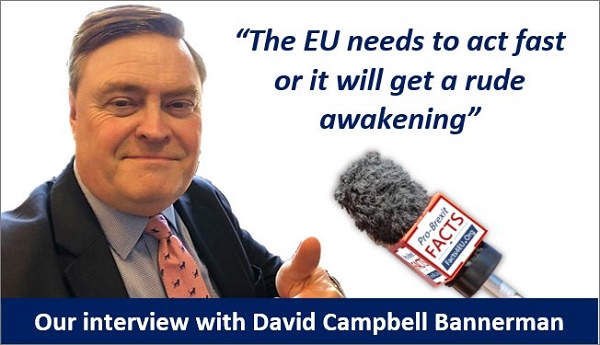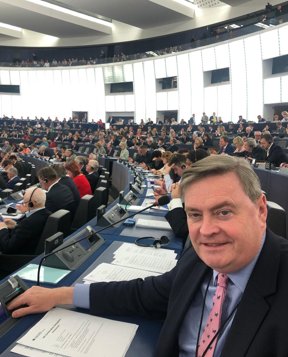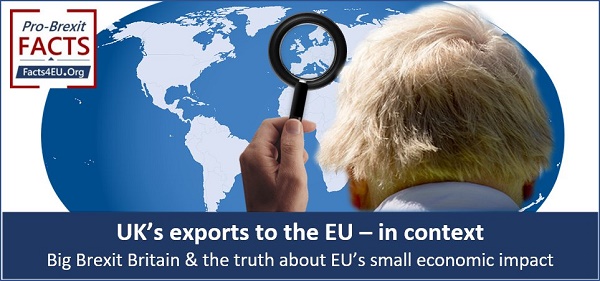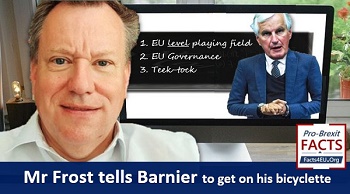“The EU called us Treasure Island and took us for granted for years”
“The EU needs to act fast or it will get a rude awakening”

© Brexit Facts4EU.Org 2020
Ex-member of EU Trade Committee spills beans on the EU, what they think of us, who will win
An exclusive and illuminating Brexit Facts4EU.Org interview
with someone who knows the sharp end
Our Editor spoke to David Campbell Bannerman, former MEP, and they discussed the following:-
- What do the EU’s politicians and officials really think of the British and Brexit?
- Who needs whom the most?
- Do you think the EU “get it”?
- How badly have we been treated in these Brexit and trade talks?
- How are the talks going?
- Do we or they need a trade deal and what are the chances of getting one?
With 48 hours to go before the start of the fourth round of UK-EU trade talks on Tuesday, Brexit Facts4EU.Org brings readers the exclusive thoughts of a man with ten years’ experience as an MEP sitting on the EU Parliament’s International Trade Committee.

An in-depth interview with David Campbell Bannerman, former MEP, former member of the EU Parliament's International Trade Committee, pro-Brexit, author of the original "Super-Canada" trade deal
1. What do the EU’s politicians and officials really think of the British and Brexit?
My experience is I think they took us for granted, overall. The Germans confirmed it to me. German business representatives told me that the UK was viewed as a 'soft market'. I know that some even called it 'Treasure Island’.
Obviously, at the moment they’re getting tariff-free access to the British market. It’s the 6th largest market in the world. It’s about the same as India this year. We’ve grown incredibly – our economy is 20% larger than Russia with that country’s immense size and resources.
So we are a big player. Obviously within the EU we've just been treated as a part of the EU’s Single Market – the “Internal Market” as the EU calls it. But we have been taken for granted for years, that’s for sure.
The EU view of the world is that the EU is very, very important, with many big companies, and a big world player. The UK was part of it, and they can't believe that we're going to 'diminish' ourselves by breaking away, be smaller in the world and less significant and less wealthy etc. They don't see it from our point of view at all. It's almost like Soviet- style thinking, actually.
They’re almost looking at us as a sort of EU spin off, still within the EU orbit. They’re struggling to accept that we’re now going to be a sovereign, independent nation, not something like an EEA country, say. The EEA was always about countries joining the EU such as Norway. The EEA was always designed as a way in to the EU not as a way out of it.
And so this is why we’re pushing quite rightly now. We’ve got it right finally after a lot of wasted time and damage caused by our previous negotiators. Unfortunately the EU is not seeing us as that independent, sovereign nation, not treating us as that and it really needs to quickly and urgently adjust its mindset, otherwise it’s going to get a rude awakening.
2. Who needs whom the most?
Well of course one of the reasons we’re again talking now is because of the excellent report you published, which highlighted the relatively small impact of our EU exports on the UK’s economy.
What's interesting about what you've pointed out is that - as I have previously argued - no one asks what proportion of our wealth, our GDP, comes from our exports to the EU.
And that comes out of your research very strongly. It's actually a very small proportion – your figures from the ONS and Treasury show that just 7.7% of our GDP comes from our goods exports to the EU. The main driver of our economic wealth is our own economy. We're selling so much to ourselves. 70%, as you found out, goes to domestic activities and 86% of our economy has nothing to do with exports to the EU.
© Brexit Facts4EU.Org - click to enlarge
Only about an eighth of our economy is trade with the EU. What matters it's not the percentage of exports but the fact that it’s only an eighth of our economy - and that is goods AND services – which goes to the EU. The great majority of goods and services are traded happily within the British Single Market. As you discovered from the research you published, 86% of what we produce does not go to the EU. And almost 70% is sold entirely within the UK.
3. Do you think they “get it”?
Well, I think reality is slowly dawning, and what's very helpful in your research is that you’re highlighting facts which are difficult to get out there. This argument that “half of our exports” mean that we have to do a deal with the EU or we're finished or severely damaged is a nonsense. It isn’t even half our exports anyway, and it’s dropping. We’re actually exporting more and more to the rest of the world.
I’ve been talking for years to many Remainers who put the argument that “ah, half of UK exports go to the EU”. Well it’s not half, it’s 44% and dropping as you pointed out. Big drop over the last 20 years. In terms of percentage there's a quarter drop in our exports to the EU over the last 20 years.
Now of course we’re becoming an external market that the EU are exporting to. The figures are demonstrating we are second after the USA - as your own research has confirmed. We are ahead of China as a market, so we're a big consumer of EU goods.

David Campbell Bannerman working in the EU Parliament
You only have to look at German cars or French wine or Danish pork to see that this is entirely true and that’s the way we like it. But it’s all based on the fact that we’re tariff free, quota free at present.
The EU has been waking up and they even quote one key statistic. 90% of growth in the world in the next 10 -15 years will come from outside Europe. It’s interesting, I went to the port of Rotterdam and they did a presentation. Rotterdam is the biggest port in Europe as your readers will know. And the Rotterdam people really confirmed this by showing that in 10 to 15 years they will hardly be in the top 10 ports in the world. It’s that scary. It’s the ports of Asia that are massively growing and that is the reality of the world. So we’ve got to set this in context.
4. How badly have we been treated in these Brexit and trade talks?
I think the answer lies in Barnier’s one page response about “well it’s in the Political Declaration, level playing field…”
It’s worrying for everyone that the EU has that mindset and your figures make it clear that the EU is not being realistic. In fact your figures show that the EU is being entirely unrealistic in their expectations of Britain. They’re expecting that Britain must drive a trade deal, when in fact these figures actually suggest that for the UK a trade deal with the EU is far less significant than they could possibly imagine.
Basically, the position we’ve got to is that they are acting unreasonably, unfairly, which is what Frost is saying. That is really predicated on this delusion about how important a trade deal is to us. I’m not saying it’s unimportant. I favour a trade deal and I favour all the other deals that go with it by the way, because this is a package. Aviation and nuclear - these are all very important and I recommend them.
What we cannot accept is how the EU has moved in the wrong direction towards a framework agreement - a partnership agreement as they have with countries like Ukraine. This absolutely is not suited to their second largest export market which is us, Britain.
Frankly it’s a bit patronising and certainly totally unsuitable to us. And so again, David Frost is absolutely right to insist that we have been offered a free trade agreement on at least three occasions by the President of the EU Donald Tusk, and by Mr Barnier. A free trade agreement which is what we’re pushing for is perfectly reasonable and this is what the EU does with other countries like Canada, Japan and South Korea.
We are acting very fairly and reasonably and we’re operating very close to existing EU trade agreements so there really shouldn’t be much of an argument.
What’s different from what I was advocating? Not a lot is very different. It very much is ‘Super Canada’ as I would call it. What one puts in a free trade agreement and what one leaves out can all be discussed but I suggest a strategic partnership agreement alongside of the trade agreement, for the political stuff, diplomatic, justice, etc.
5. How are the talks going?
Basically I’m delighted about our positioning and I think David Frost has done an exceptionally good job. He’s really taken us to exactly the right position with the EU. He’s not showing weakness, he’s not backtracking, and actually all he’s asking for is entirely fair and reasonable.
© Brexit Facts4EU.Org
The clever thing about David Frost’s positioning and the government’s positioning is it’s all based on existing free trade agreements between the EU and countries that are actually smaller trading partners than us. And that means Canada particularly. Of course I invented or proposed ‘Super-Canada’ which you kindly interviewed me about and promoted a couple of years ago. Super-Canada is bigger-better-wider than the Canadian deal – and this is broadly where we are, really. That’s what we’re asking for: a Canada style deal.
Since then there has also been Japan, which was signed more recently. Then of course there are older deals like the one between the EU and South Korea. It has some major aspects such as the KIA and other cars coming in.
So by keeping cleverly so close to these (and proposed EU agreements with Australia and New Zealand on services), Frost is saying “well you’re offering these to people with much smaller export markets to the EU, and who are much smaller trading partners with the EU,than we are. You’d imagine that your bigger trading partner should get a better deal, or certainly treated with more seriousness.”
6. Do we or they need a trade deal and what are the chances of getting one?

© Brexit Facts4EU.Org 2020
So I think the data you provided in your recent report is a wake-up call to the European Union. The EU often exists in its own bubble of self-importance and unfortunately that thinking is now holding us back. It’s actually holding Mr Barnier back, through these Council guidelines, from negotiating a perfectly good trade deal from the EU’s point of view.
I’m very much in favour of a great deal with the EU: being open and trading freely, and still enjoying its wonderful products, and selling our wonderful products to them. And that is in everyone’s interest. But they are trying basically to control and to override Westminster with things such as this nonsense over the level playing field. That is simply a fear of Britain being more competitive.
Then we also have this nonsense that we’re large and we’re close to the EU so they can’t offer us a proper trade deal…. I mean that is a nonsense because it doesn’t work like that in trade terms.
The US and China are much further away than we are from the EU physically and yet they sell more product to the EU than we do. China is a particularly good case, as their their goods come a long way and dominate EU imports. So that isn’t a valid trade argument.
The problem is these guidelines from the EU Council and EU Parliament. They are holding us back. I think the EU needs to understand that we can live without a trade deal - and your figures point out the share of our economy taken up with exports to the EU is much smaller than people actually understand it to be.
We’ve all been fed this stuff about exports for years. I’m not saying trade with the EU is not important - because it is - but we should not sacrifice very important parts of our economy and the way we do things. Particularly in the post-COVID era we've got to be much nimbler as an economy and as a country. We've got to be more competitive, we've got to be less regulated. All of these things can be compromised by a bad deal with the EU which include regulatory control. That is not acceptable, that is too big a price to pay.
The European Union just needs to get the fact that we are a sovereign, independent country again and we are now on a par with the USA, Japan, Canada, South Korea, and all the independent and sovereign nations the EU is doing business with.
Observations
We would like to thank Mr Campbell Bannerman for giving up his time to talk to our Editor about the current state of affairs regarding the UK-EU trade talks.
We found his observations very interesting and we hope that readers did too. It is generally worthwhile listening to someone who has had direct experience in these matters, and of course David Frost has also spoken to DCB.
If you have never donated towards our work, may we suggest that today would be a good day to do so? Work like ours is immensely time-consuming, which is possibly why so few people seem to do it. We rely 100% on ordinary people to keep us going. Quick and secure donation methods are below. Your details will be confidential unless you expressly tell us otherwise. Thank you so much for promoting freedom of speech and supporting our work towards the achievement of a fully-free and independent United Kingdom.
[ Sources: David Campbell Bannerman ] Politicians and journalists can contact us for details, as ever.
Brexit Facts4EU.Org, Sun 31 May 2020
Click here to go to our news headlines
And please scroll down to COMMENT on the above article.
Since before the EU Referendum, Brexit Facts4EU.Org
has been the most prolific researcher and publisher of Brexit facts in the world.
Supported by MPs, MEPs, & other groups, our work has impact.
We think facts matter. Please donate today, so that we can continue to ensure a clean Brexit is finally delivered.
Paypal Users Only - Choose amount first
Quick One-off
Monthly




Something to say about this? Scroll down for reader comments